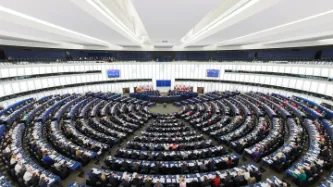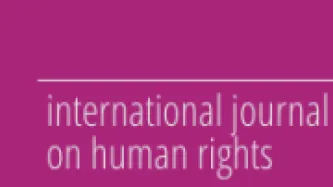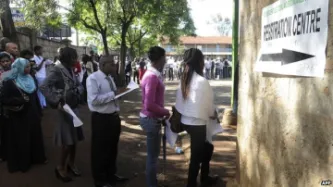Search
Content type: Case Study
The run up to Kenya’s 2017 elections was extremely tense. Kenya has a history of violently fought elections and there was fear this election would be no different. It was in this tense environment, that companies like Cambridge Analytica and Harris Media – and their digital offerings - got involved in the election campaigns.
Cambridge Analytica’s business model is by now familiar, they compiled a huge amount of data points, often through illegal means, to create profiles on individuals –…
Content type: News & Analysis
This piece was first published in GDPR today in March 2019.
Elections, referendums and political campaigns around the world are becoming ever more sophisticated data operations. This raises questions about the political use and abuse of personal data. With the European Union elections fast approaching and numerous national and local elections taking place across EU Member States, it is essential that the legal frameworks intended to protect our personal data do just that.
Member State…
Content type: News & Analysis
Photo by DAVID ILIFF. License: CC-BY-SA 3.0
Between 23 and 26 May 2019 Europeans will be voting to elect members of the European Parliament.
Since the last elections in 2014, much has changed within and without the European Union: the rise of nationalism and Euroscepticism, the protracted armed conflict in Ukraine and the occupation of Crimea by Russia, the new political orientation of the United States, just to name a few.
Among the new challenges facing these elections is…
Content type: Long Read
This image was found here.
Spain is holding a national general election on April 28 (its third in four years). Four weeks later Spaniards will again go to the polls to vote in the European Parliament elections. At Privacy International we are working to investigate and challenge the exploitation of people’s data in the electoral cycle including in political campaigns. This includes looking at the legal frameworks governing the use of data by political parties and their…
Content type: Examples
In January 2019, Facebook announced it would extend some of the rules and transparency tools it developed for political advertising for upcoming spring elections in Nigeria, Ukraine, India, and the EU. In Nigeria, the site will bar electoral ads from advertisers outside the country where the election is being held, build a searchable library of electoral ads and retaining them for seven years, check the identity of individuals buying political ads against government-issued documents, and…
Content type: Examples
In the run-up to the May 2019 European Parliament elections, Google announced it would launch a new set of transparency tools to combat voter manipulation. Before being allowed to buy advertising on Google platforms, campaigns will be required to verify their identity, and approved ads will be required to display the identity of their purchaser. Google will build a real-time searchable database of all political ads and show their purchasers, costs, and demographics. Facebook announced similar…
Content type: Advocacy
UPDATE 13 February: Facebook announced that it would open up its Ad Archive API next month. Read Mozilla's statement about the response here.
On 11 February 2019, Privacy International joined Mozilla and 36 organisations in an open letter to Facebook call on Facebook to make good on its commitments to provide more transparency around political advertising ahead of the 2019 EU Parliamentary Elections.
Specifically, our open letter urges Facebook to:
Roll out a functional, open Ad…
Content type: Examples
On the night of June 23, 2016, as the polls closed Britain's Sky News broadcast what sounded like a concession statement from Nigel Farage, the leader of the campaign to leave the EU, plus a YouGov exit poll indicating that the country had voted to remain; over an hour later, Farage reiterated his concession to the Press Association. The combination pushed up the pound on the world's foreign exchanges. A few hours later, when the true result was announced, the pound crashed - but in between a…
Content type: News & Analysis
Photo was found here
This essay was published in The Sur International Journal of Human Rights, Issue 27, July 2018.
Abstract:
This essay focuses on elections in Kenya and analyses the use of technology and the exploitation of personal data in both the electoral process and campaigning. We only need to look to Kenya’s election history to understand why it is important. The 2007/2008 election resulted in violence that killed over 1,000 people and displaced over 600,000. The 2013 election was…
Content type: Report
The use of biometric technology in political processes, i.e. the use of peoples’ physical and behavioural characteristics to authenticate claimed identity, has swept across the African region, with 75% of African countries adopting one form or other of biometric technology in their electoral processes. Despite high costs, the adoption of biometrics has not restored the public’s trust in the electoral process, as illustrated by post-election violence and legal challenges to the results of…
Content type: Long Read
In December 2017, Privacy International published an investigation into the use of data and microtargeting during the 2017 Kenyan elections. Cambridge Analytica was one of the companies that featured as part of our investigation.
Due to the recent reporting on Cambridge Analytica and Facebook, we have seen renewed interest in this issue and our investigation. Recently in March of 2018, Channel 4 News featured a report on micro targeting during the 2017 Kenyan Presidential Elections, and the…
Content type: News & Analysis
This post was written by PI Policy Officer Lucy Purdon.
In 1956, US Presidential hopeful Adlai Stevenson remarked that the hardest part of any political campaign is how to win without proving you are unworthy of winning. Political campaigning has always been a messy affair and now the online space is where elections are truly won and lost. Highly targeted campaign messages and adverts flood online searches and social media feeds. Click, share, repeat; this is what political engagement looks…
Content type: Long Read
The battle for Kenyan voters’ allegiance in the 2017 Presidential election was fought on social media and the blogosphere. Paid advertisements for two mysterious, anonymous sites in particular started to dominate Google searches for dozens of election-related terms in the months leading up to the vote. All linked back to either “The Real Raila”, a virulent attack campaign against presidential hopeful Raila Odinga, or Uhuru for Us, a site showcasing President Uhuru Kenyatta’s accomplishments. As…
Content type: Press release
A new investigation published today by Privacy International reveals the role of an American data-based digital advertising company in the highly divisive online re-election campaign of Kenyan president Uhuru Kenyatta.
In the run-up to Kenya's presidential election in August 2017, paid advertisements for two mysterious sites dominated Google searches for election-related terms and flooded Kenyans' social media feeds. All linked back to either 'The Real Raila', a virulent attack campaign…
Content type: News & Analysis
Image source: AFP
Earlier this month, the Kenyan daily The Star reported that UK-based data analytics firm Cambridge Analytica had been quietly contracted by President Uhuru Kenyatta’s party in a bid to win himself a second term in office. State House officials were quick to deny the claims, while the company itself issued no comment.
Cambridge Analytica has exploded onto the scene following revelations that its psychometric profiling techniques were used and reportedly played a role in…
Content type: Advocacy
Earlier this month, it was reported that UK-based data analytics firm Cambridge Analytica had been quietly contracted by President Uhuru Kenyatta’s party in a bid to win a second term in office. Privacy International has written to Cambridge Analytica to learn more about how the company assessed the risk of its work in Kenya and how it will ensure that Kenyans’ personal data will be protected.














